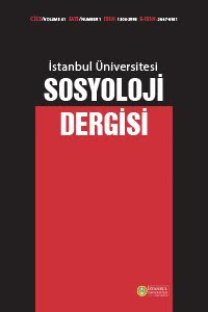Durkheim Üzerine Dört Tip Entelektüel Üretim Biçimi ve Türkiye’deki Durkheim Yansımaları
.
Anahtar Kelimeler:
.
Four Kinds of Intellectual Production in Durkheim with Reflections on Durkheim in Turkey
___
- Ahmed Şuayb. (1899). Hayat ve kitaplar: Tetebbuat-ı edebiyye ve tarihiyye. İstanbul: Alem Matbaası.
- Alexander, J. C. (2014). The antinomies of classical thought: Marx and Durkheim (Theoretical logic in sociology). London: Routledge. Bulut Y. (2015). Sosyal ve siyasal arasına sıkışmış bir düşünür: Ziya Gökalp ve hars-medeniyet kuramı. Sosyoloji Konferansları Dergisi, 2015-2(52), 79–109.
- Collins, R. (2004). Interaction ritual chains. Princeton and Oxford: Princeton University Press
- Gökalp, Z. (1918). Türkleşmek, İslamlaşmak, muasırlaşmak. İstanbul: Yeni Mecmua.
- Habermas, J. (1984). Theory of communicative action (Vol. 1: Reason and the rationalization of society). Boston, MA: Beacon Press.
- Kabakcı, E. (2011). Durkheim ve Gökalp: Tarih, ideoloji ve sosyolojinin özerkliği meselesi. K. Tuna & İ. Coşkun), Ziya Gökalp içinde (s. 205–217). Ankara: Kültür ve Turizm Bakanlığı.
- Lockwood, D. (1992). Solidarity and schism: “The Problem of disorder” in Durkheimian and Marxist sociology. Oxford: Clarendon Press.
- Parla, T. (1989). Ziya Gökalp, Kemalizm ve Türkiye’de korporatizm (Yay. haz. S. Yücesoy ve F. Üstel). İstanbul: İletişim Yayınları.
- Parsons, T. (1937). The structure of social action. New York: McGraw Hill. Smith, P. (in press). Durkheim and the Durkheimian tradition. Cambridge: Polity Press.
- Swidler, A. (1986). Culture in action. American Sociological Review, 51(2), 273–286.
- Tilly, C. (1981). Useless Durkheim. In As Sociology Meets History (pp. 95–108). New York: Academic Press.
- ISSN: 1304-2998
- Başlangıç: 2020
- Yayıncı: İstanbul Üniv. Edebiyat Fak. Sosyoloji Böl.
Sayıdaki Diğer Makaleler
You Only Get What You Give? A New Radical Durkheimian Political Economy of Sacrifice
Durkheim’s Ghost: The Century after His Death: France, Germany, Turkey
Avrupa Refah Rejimleri ve Türkiye’de Öznel İyi Oluş
Durkheim’ın Toplumu Bir Özne, Toplumsalı Bir Nesne Olarak Kavramsallaştırma Çabası
Durkheim Üzerine Dört Tip Entelektüel Üretim Biçimi ve Türkiye’deki Durkheim Yansımaları
Aynur ERDOĞAN COŞKUN, Philip SMİTH
From Holism to Participation: Three Phases in Durkheim’s Work
Durkheim’da Toplum-Çevre Etkileşimi: Dışlayıcı Toplumsal Olgulara Karşı Çevreci Potansiyel
